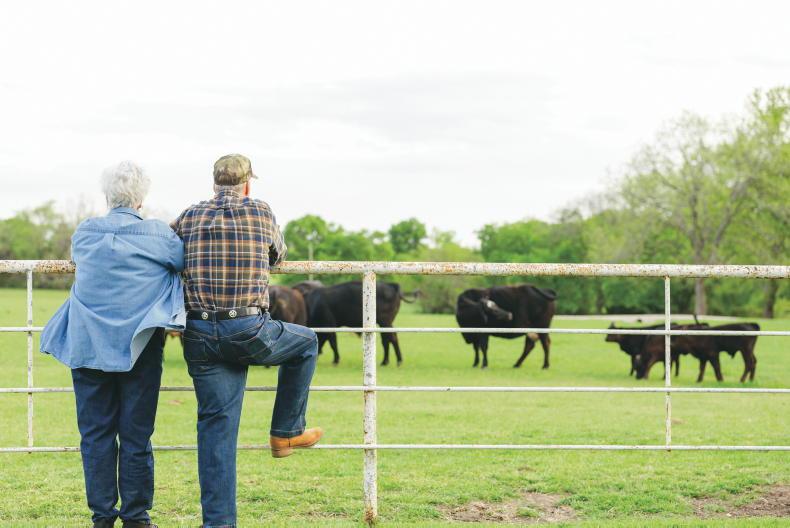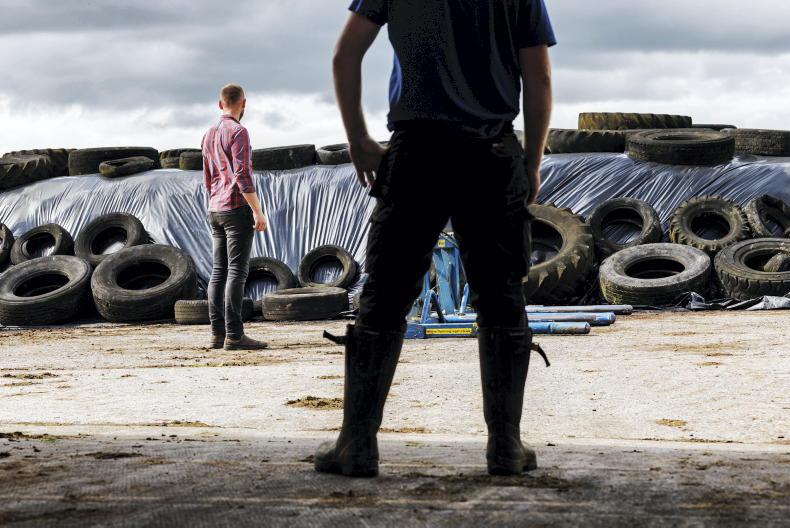I received a lot of PRSI queries over the last week. They were not all related to the new change where a farmer’s partner who assists in the farming business now has the opportunity to make Pay Related Social Insurance (PRSI) contributions in their own right. I spoke to Declan McEvoy from the IFAC tax department about the queries and the issues around PRSI. Declan made quite a few points:
• PRSI contributions give one of the best returns on investment you can make for retirement.• Some farmers on low income will see it as an extra cost but using a direct debit of €41.66 per month will help make payments. • If you are making over €41,800, it is beneficial to allocate income above this to your wife, up to €65,600.• Talk to your accountant before you make tax returns before the 31 October deadline.Reader queries
“My wife has just left her job and is helping me on the farm. We were looking at applying for the homemaker’s scheme to ensure the years she was at home would not be counted for averaging for the contributory pension. Would we be better off using the new extension? Would there be any benefit to paying her a wage for tax purposes as the income from the farm puts me in the high tax bracket?”
Attributing at least €5,000 and up to €12,500 self-employed income to your wife on the tax return would be a better option than the homemaker’s scheme. The reason is that up to €12,500, the PRSI contribution would be just €500 a year, for which your wife would get 52 contributions each year. Rather than just maintaining her average by using the homemaker’s scheme, you could increase her total contributions. This would be beneficial when she does get to retirement age.
Declan McEvoy of IFAC is clear that there is no benefit to paying your wife a wage to reduce tax, especially now, as it would rule her out of making PRSI contributions. The reason for this is that a partner employed by their self-employed spouse is still not allowed to pay PRSI on that income. Declan feels this is unlikely to be changed as it would make the spouse making PRSI contributions, on what is effectively a PAYE income, eligible for a whole range of benefits under social welfare, such as jobseeker’s allowance, not just the contributory pension.
On the tax side, if you are making over €41,800, it is beneficial to allocate income above this to your wife. The reason is that as a couple you can go up to €65,600 with two incomes at the lower rate. Over this level, there is no additional benefit as all income will be taxed at the higher rate.
“We are in the situation where we are making just €20,000, so money is tight. If my husband paid the 4% PRSI it would be €800. However, if we submitted €5,000 in my name, the PRSI would be €1,100. Is it worth it?”
Yes. He would pay €600 on €15,000 income and having allocated €5,000 to you, you would be eligible to make the minimum payment of €500. If you paid the €500 for 10 years, it would cost €5,000. Even if you got a pension of €92 a week, the very lowest level, you get that money back the first year you get a pension. You would be entitled to that same payment every year thereafter. If you qualify for the highest pension, you would get nearly €12,000 a year. One way to make it easier to pay is to set up a direct debit of €41.66 a month to pay the PRSI contributions.
“You said last week that you need to have income of €5,000 to be eligible to pay PRSI. What happens if the farm makes less that the €10,000 needed to allow the income to be divided between the husband and wife so we are both eligible. Could I make a voluntary contribution?”
Voluntary contributions are Pay Related Social Insurance (PRSI) contributions you can opt to pay if you are between the age of 16 and 66 and are no longer covered by compulsory PRSI. The rate of voluntary contributions payable is always determined by the last rate of PRSI contribution paid by a person. If the last PRSI contribution paid by you is Class S (self-employed), the amount payable is currently €500 per year. However, to become a voluntary contributor on or after 6 April 2014, you must have previously paid 468 weeks’ PRSI. After 6 April 2015, you must have previously paid 520 weeks’ PRSI to be eligible to pay voluntary contributions. If you are not eligible to pay voluntary contributions, your husband might be. So you could allocate €5,000 of income to yourself and allocate him the balance. You can pay voluntary contributions by cheque, bank draft or standing order. Your contribution can be paid as a lump sum before the end of the contribution year or by quarterly or half-yearly instalments during the contribution year. You must pay the full contribution for a year no later than five months after the end of the year in which the payment is due. Talk to your accountant or call the voluntary contributions section of the Revenue on Locall 1890-690690.
I received a lot of PRSI queries over the last week. They were not all related to the new change where a farmer’s partner who assists in the farming business now has the opportunity to make Pay Related Social Insurance (PRSI) contributions in their own right. I spoke to Declan McEvoy from the IFAC tax department about the queries and the issues around PRSI. Declan made quite a few points:
• PRSI contributions give one of the best returns on investment you can make for retirement.• Some farmers on low income will see it as an extra cost but using a direct debit of €41.66 per month will help make payments. • If you are making over €41,800, it is beneficial to allocate income above this to your wife, up to €65,600.• Talk to your accountant before you make tax returns before the 31 October deadline.Reader queries
“My wife has just left her job and is helping me on the farm. We were looking at applying for the homemaker’s scheme to ensure the years she was at home would not be counted for averaging for the contributory pension. Would we be better off using the new extension? Would there be any benefit to paying her a wage for tax purposes as the income from the farm puts me in the high tax bracket?”
Attributing at least €5,000 and up to €12,500 self-employed income to your wife on the tax return would be a better option than the homemaker’s scheme. The reason is that up to €12,500, the PRSI contribution would be just €500 a year, for which your wife would get 52 contributions each year. Rather than just maintaining her average by using the homemaker’s scheme, you could increase her total contributions. This would be beneficial when she does get to retirement age.
Declan McEvoy of IFAC is clear that there is no benefit to paying your wife a wage to reduce tax, especially now, as it would rule her out of making PRSI contributions. The reason for this is that a partner employed by their self-employed spouse is still not allowed to pay PRSI on that income. Declan feels this is unlikely to be changed as it would make the spouse making PRSI contributions, on what is effectively a PAYE income, eligible for a whole range of benefits under social welfare, such as jobseeker’s allowance, not just the contributory pension.
On the tax side, if you are making over €41,800, it is beneficial to allocate income above this to your wife. The reason is that as a couple you can go up to €65,600 with two incomes at the lower rate. Over this level, there is no additional benefit as all income will be taxed at the higher rate.
“We are in the situation where we are making just €20,000, so money is tight. If my husband paid the 4% PRSI it would be €800. However, if we submitted €5,000 in my name, the PRSI would be €1,100. Is it worth it?”
Yes. He would pay €600 on €15,000 income and having allocated €5,000 to you, you would be eligible to make the minimum payment of €500. If you paid the €500 for 10 years, it would cost €5,000. Even if you got a pension of €92 a week, the very lowest level, you get that money back the first year you get a pension. You would be entitled to that same payment every year thereafter. If you qualify for the highest pension, you would get nearly €12,000 a year. One way to make it easier to pay is to set up a direct debit of €41.66 a month to pay the PRSI contributions.
“You said last week that you need to have income of €5,000 to be eligible to pay PRSI. What happens if the farm makes less that the €10,000 needed to allow the income to be divided between the husband and wife so we are both eligible. Could I make a voluntary contribution?”
Voluntary contributions are Pay Related Social Insurance (PRSI) contributions you can opt to pay if you are between the age of 16 and 66 and are no longer covered by compulsory PRSI. The rate of voluntary contributions payable is always determined by the last rate of PRSI contribution paid by a person. If the last PRSI contribution paid by you is Class S (self-employed), the amount payable is currently €500 per year. However, to become a voluntary contributor on or after 6 April 2014, you must have previously paid 468 weeks’ PRSI. After 6 April 2015, you must have previously paid 520 weeks’ PRSI to be eligible to pay voluntary contributions. If you are not eligible to pay voluntary contributions, your husband might be. So you could allocate €5,000 of income to yourself and allocate him the balance. You can pay voluntary contributions by cheque, bank draft or standing order. Your contribution can be paid as a lump sum before the end of the contribution year or by quarterly or half-yearly instalments during the contribution year. You must pay the full contribution for a year no later than five months after the end of the year in which the payment is due. Talk to your accountant or call the voluntary contributions section of the Revenue on Locall 1890-690690.










SHARING OPTIONS